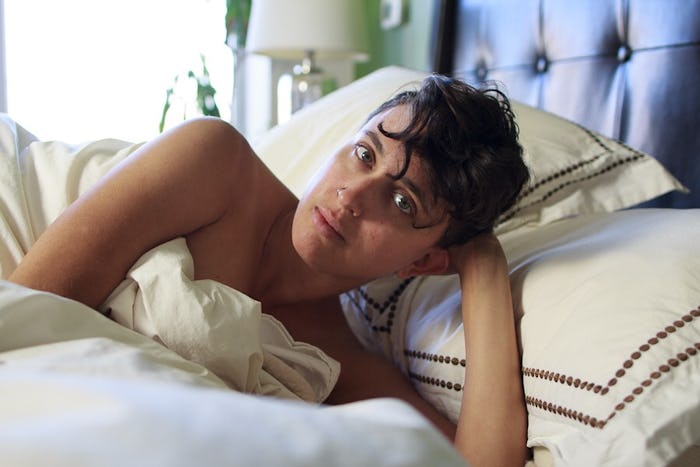Life

What It Felt Like To Be In My Body After Relinquishing A Baby
A crying newborn would’ve been something to focus on after birth, a source of concrete tasks. My mind would’ve had somewhere to go. Instead, when I came home from the hospital without the son I was relinquishing for adoption, I had to be alone with my disorienting postpartum body.
Physically and psychically, I felt like all the furniture in what I understood to be the house of Me had been rearranged. I had gotten used to my kiddo squirming around inside me in the last trimester. Now all that movement was gone; there was stillness and absence instead. My tits were rock-hard, trying to feed a kid who wasn't there, not having gotten the memo. I had gotten a flu shot in the hospital, and I started having flu symptoms, feeling woozy and feverish. My stomach was puffy with purple stretch marks, and it just didn’t look or feel like mine. Even pooping was terrifying. And as far as I was concerned, my pussy didn’t exist; I’d torn during labor, and was determined not to look at my crotch before the stitches healed. It was just a place that was bleeding a lot, a place I had to rinse out with water from a squeeze bottle every time I peed.
All of these things spun around a new grief that had flattened me. I didn’t know who I was anymore. Before getting pregnant, I’d identified as a happy-go-lucky theatre artist, a chaotic 20-something who was fine with routinely overdrawing my bank account because everything was going to work out eventually, right? But now my reckless flailing had cost me something so much more than financial peace of mind, had cost me the ability to raise my child, and my whole sense of my life had shattered. I didn’t know what would take its place.
Small talk was impossible and my body was inside out. What was I supposed to say to anyone?
I made my decision to pursue adoption almost as soon as I peed on a stick and got two lines. In some ways, it was a no-brainer. I’d defaulted on two student loans and three credit cards, and my wages were being garnished. I lived with two roommates. I couldn’t count on the birth father. I had no infrastructure in which to even imagine myself parenting right now. Initially, adoption had seemed like a grand adventure, an opportunity to experience the thrill of pregnancy while creating queer family. But once I said goodbye to my son, adoption became the greatest grief of my life.
I couldn't relate to people anymore, either. Each grief has its own flavor; the death of a parent is different than a miscarriage is different than relinquishing a baby for adoption, and I knew almost zero birth mothers, so I was alone with my mourning. Small talk was impossible and my body was inside out. What was I supposed to say to anyone? They wouldn't get it anyway. Nothing could possibly go back to normal. What would normal even be now?
All my energy went into endurance. If I got through another day in my new body, it would feel 0.0001% more like my own when I woke up the next morning, be healed 0.0001% more. If I got through another day of my grief — with the help of friends who brought me home-cooked meals and pumpkin beer and chocolate and camping chairs so I could sit on my stoop and enjoy the sunshine — the next day would feel 0.0001% more endurable.
Binding my breasts with an Ace bandage stopped them leaking. The flu symptoms went away, and so did my hemorrhoids. I eventually stopped bleeding. Started having sex again. My stomach is still round and stretch-marked, but the marks became paler, the way light filters through to the bottom of a pool. I visited my son over and over (it’s an open adoption), watched him take up ASL and aerial silks and learning to “floss,” developed a rapport with his adoptive parents. I started writing again. I lied and hustled my way into a new job that paid twice my previous salary. Got a credit card that I didn’t default on. My wages eventually stopped being garnished for my defaulted student loans.
Even after pelvic floor physical therapy, I still sometimes feel like I’m going to wet myself when I sneeze, and sex never went back to feeling the way it did before my pregnancy. And as my son grows and changes, so does our relationship, and so does my grief. He’s 7 and I’m still devastated that I couldn't raise him. I probably always will be.
The difference now is that my body and my grief are lived-in now. They’re not alienating or unfamiliar or destabilizing anymore. They’re mine.
This article was originally published on